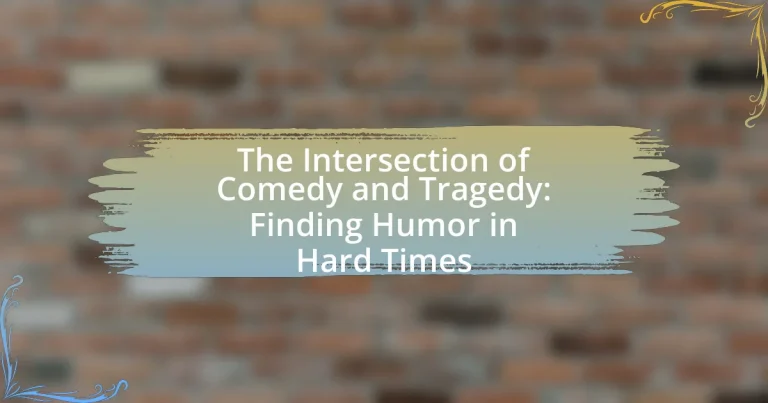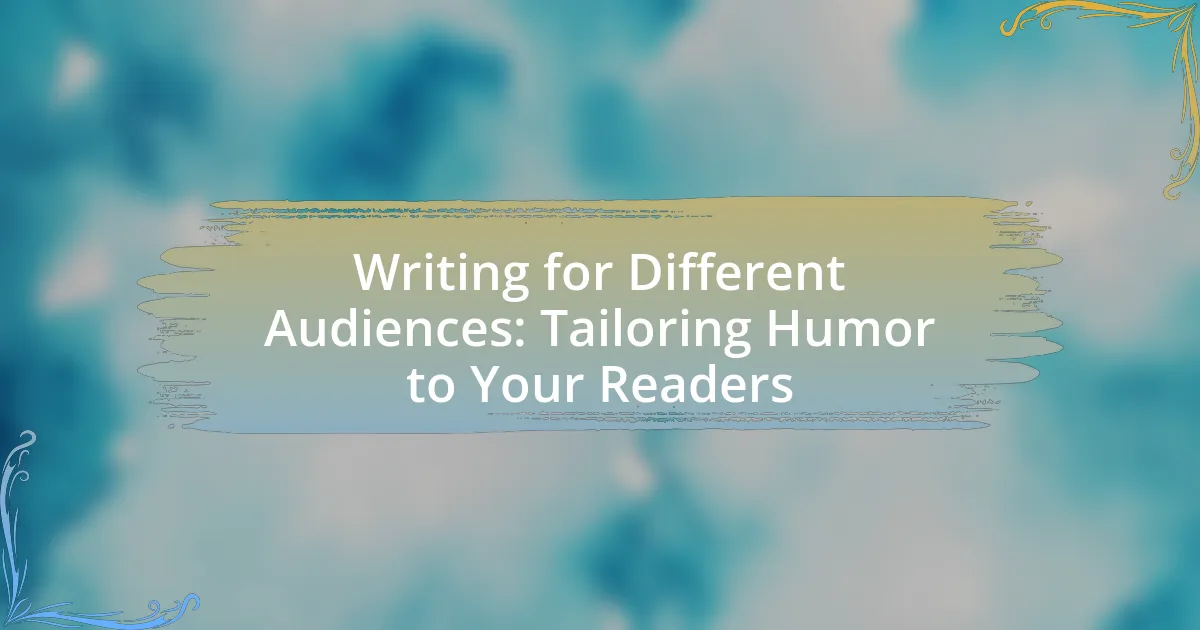The article explores the intersection of comedy and tragedy, emphasizing how humor can emerge from suffering and serve as a coping mechanism during difficult times. It examines the coexistence of these genres in literature and performance, tracing their historical roots back to ancient Greek theater and highlighting cultural interpretations across different societies. The article also discusses the psychological benefits of humor, including its role in fostering resilience and social connections, while addressing the challenges and ethical considerations of blending comedy with tragic subjects. Additionally, it provides practical tips for individuals to find humor in their struggles and resources for further exploration of humor in tough times.
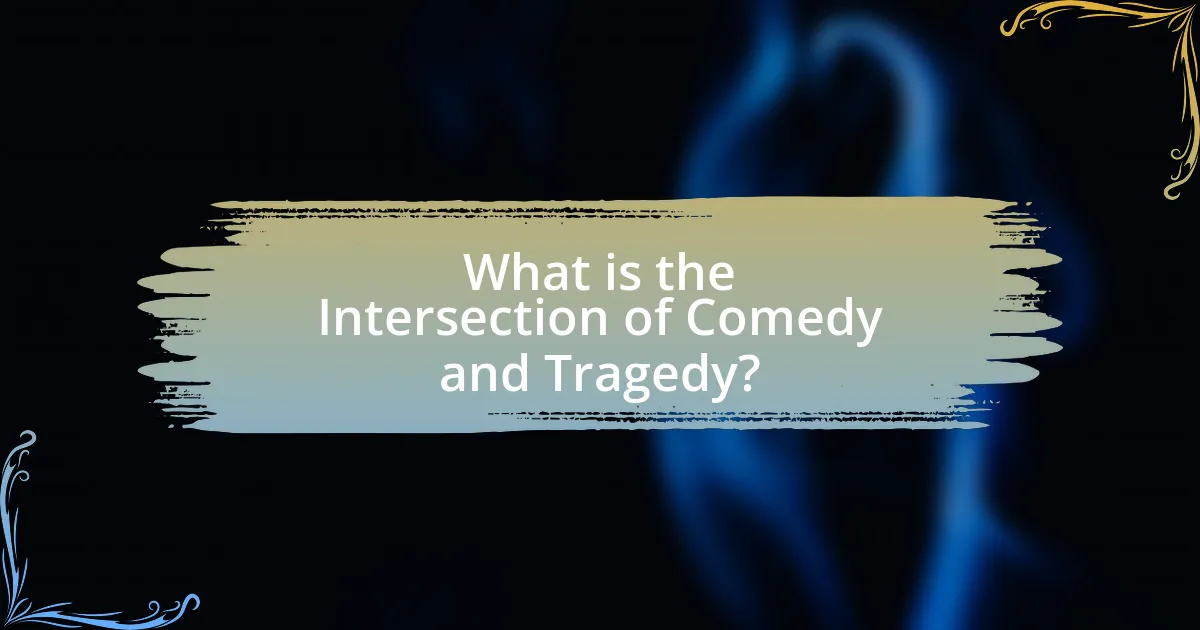
What is the Intersection of Comedy and Tragedy?
The intersection of comedy and tragedy lies in their shared exploration of the human experience, where humor often emerges from the depths of suffering. This relationship is evident in various forms of art, such as literature and theater, where tragic circumstances can elicit laughter as a coping mechanism. For instance, Shakespeare’s plays frequently blend comedic elements with tragic themes, illustrating how humor can provide relief amidst despair. This duality highlights the complexity of emotions and the resilience of the human spirit, demonstrating that even in dire situations, laughter can coexist with sorrow.
How do comedy and tragedy coexist in literature and performance?
Comedy and tragedy coexist in literature and performance by highlighting the complexities of human experience, often revealing deeper truths through juxtaposition. This coexistence allows audiences to engage with serious themes while also finding relief in humor, as seen in works like Shakespeare’s “Hamlet,” where moments of levity contrast with profound sorrow. The blending of these genres serves to enhance emotional resonance, as the laughter that arises from comedic elements can provide a necessary counterbalance to the weight of tragic events, ultimately enriching the narrative and deepening audience engagement.
What are the historical roots of combining comedy and tragedy?
The historical roots of combining comedy and tragedy can be traced back to ancient Greek theater, where playwrights like Aeschylus and Aristophanes explored the duality of human experience. In this context, tragedy often dealt with serious themes such as fate and suffering, while comedy provided a counterbalance through humor and satire. The blending of these genres became prominent in works like “Lysistrata” by Aristophanes, which addressed serious social issues through comedic elements, illustrating how humor can emerge from hardship. This interplay laid the foundation for later theatrical traditions, influencing Renaissance drama and modern storytelling, where the juxtaposition of comedic and tragic elements continues to resonate in exploring the complexities of life.
How do different cultures interpret the blend of comedy and tragedy?
Different cultures interpret the blend of comedy and tragedy through unique lenses shaped by their historical, social, and philosophical contexts. For instance, in Western cultures, the juxtaposition of humor and sorrow is often seen in theatrical works, such as Shakespeare’s plays, where tragic elements coexist with comedic relief, reflecting the complexity of human experience. In contrast, Japanese culture embraces this blend through the concept of “mono no aware,” which acknowledges the beauty in transience and often incorporates humor in the face of suffering, as seen in traditional Noh and Kabuki theater. Additionally, in Latin American cultures, the “tragicomedia” genre highlights the absurdity of life’s struggles, blending humor with tragic narratives to convey resilience. These interpretations illustrate how different societies utilize the interplay of comedy and tragedy to navigate and articulate their collective experiences.
Why is humor important during hard times?
Humor is important during hard times because it serves as a coping mechanism that helps individuals manage stress and emotional pain. Research indicates that laughter triggers the release of endorphins, the body’s natural feel-good chemicals, which can alleviate feelings of anxiety and depression. For instance, a study published in the journal “Psychological Science” found that humor can enhance resilience, allowing people to better navigate difficult situations. Additionally, humor fosters social connections, providing a sense of community and support, which is crucial during challenging periods.
How does humor serve as a coping mechanism?
Humor serves as a coping mechanism by providing individuals with a way to alleviate stress and reframe negative experiences. It allows people to distance themselves from difficult situations, making them feel more manageable. Research indicates that laughter triggers the release of endorphins, which are natural mood lifters, and can reduce levels of stress hormones like cortisol. For instance, a study published in the journal “Psychological Science” by Robert Provine found that laughter can enhance social bonding and improve emotional resilience, demonstrating its effectiveness in coping with adversity.
What psychological benefits does humor provide in difficult situations?
Humor provides significant psychological benefits in difficult situations by acting as a coping mechanism that reduces stress and enhances resilience. It allows individuals to reframe challenging circumstances, promoting a sense of control and perspective. Research indicates that laughter triggers the release of endorphins, which are natural mood lifters, and can decrease levels of stress hormones like cortisol. A study published in the journal “Psychological Science” by Robert Provine found that laughter can foster social connections, which are crucial for emotional support during tough times. Thus, humor not only alleviates immediate emotional distress but also strengthens social bonds, contributing to overall psychological well-being.
What are some examples of comedy emerging from tragedy?
Examples of comedy emerging from tragedy include works like “The Producers,” a musical that satirizes the Holocaust by depicting a scheme to produce a Broadway flop about Hitler, and “MAS*H,” a television series that uses humor to address the grim realities of war and medical crises during the Korean War. Additionally, the stand-up routines of comedians like Louis C.K. often draw on personal tragedies and societal issues, transforming painful experiences into comedic material. These examples illustrate how humor can serve as a coping mechanism, allowing audiences to confront difficult subjects through laughter.
How have comedians addressed serious topics through humor?
Comedians have addressed serious topics through humor by using satire, observational comedy, and personal anecdotes to highlight societal issues and provoke thought. For instance, comedians like George Carlin and Richard Pryor tackled subjects such as race, politics, and social injustice, often blending humor with critical commentary. This approach allows audiences to engage with difficult subjects in a more accessible manner, facilitating discussions that might otherwise be uncomfortable. Research indicates that humor can serve as a coping mechanism, helping individuals process trauma and societal challenges, as seen in the works of comedians during events like the September 11 attacks, where humor was used to address grief and fear.
What role does satire play in highlighting tragic events?
Satire serves as a critical tool for highlighting tragic events by using humor to provoke thought and encourage discourse. Through exaggeration and irony, satire exposes the absurdities and injustices surrounding tragic circumstances, making them more accessible for public engagement. For instance, political cartoons often depict leaders’ failures during crises, prompting audiences to reflect on societal issues. Historical examples include Jonathan Swift’s “A Modest Proposal,” which used satire to address the dire poverty in Ireland, effectively drawing attention to the severity of the situation. By framing tragedy in a satirical context, it not only entertains but also fosters awareness and critical examination of the underlying problems.
How can we find humor in our own hard times?
Finding humor in our own hard times can be achieved by reframing our experiences and embracing a lighter perspective. This approach allows individuals to view their struggles through a comedic lens, which can alleviate stress and foster resilience. Research indicates that humor can serve as a coping mechanism, helping to reduce anxiety and improve emotional well-being. For instance, a study published in the Journal of Health Psychology found that individuals who utilized humor during stressful situations reported lower levels of distress and greater life satisfaction. By recognizing the absurdities in challenging situations and sharing these moments with others, we can cultivate a sense of connection and support, further enhancing our ability to cope with adversity.
What techniques can individuals use to incorporate humor into their lives during adversity?
Individuals can incorporate humor into their lives during adversity by practicing self-deprecating humor, engaging in comedic media, and sharing funny experiences with others. Self-deprecating humor allows individuals to laugh at their own misfortunes, which can reduce stress and foster resilience. Engaging with comedic media, such as stand-up comedy or humorous films, provides a distraction and can uplift mood, as studies show that laughter triggers the release of endorphins, promoting a sense of well-being. Additionally, sharing funny experiences with friends or family can create a supportive environment, reinforcing social bonds and providing emotional relief during tough times.
How can storytelling and sharing experiences foster humor in tough situations?
Storytelling and sharing experiences can foster humor in tough situations by creating a shared understanding and connection among individuals facing adversity. When people recount their challenges through narratives, they often highlight absurdities or unexpected outcomes, which can elicit laughter and lighten the emotional burden. Research indicates that humor can serve as a coping mechanism, helping individuals to reframe their experiences and find relief in shared laughter. For instance, a study published in the journal “Psychological Science” by Robert Provine demonstrates that laughter often occurs in social contexts, reinforcing bonds and promoting resilience during difficult times. This collective experience of humor not only alleviates stress but also strengthens social ties, making it easier to navigate hardships together.
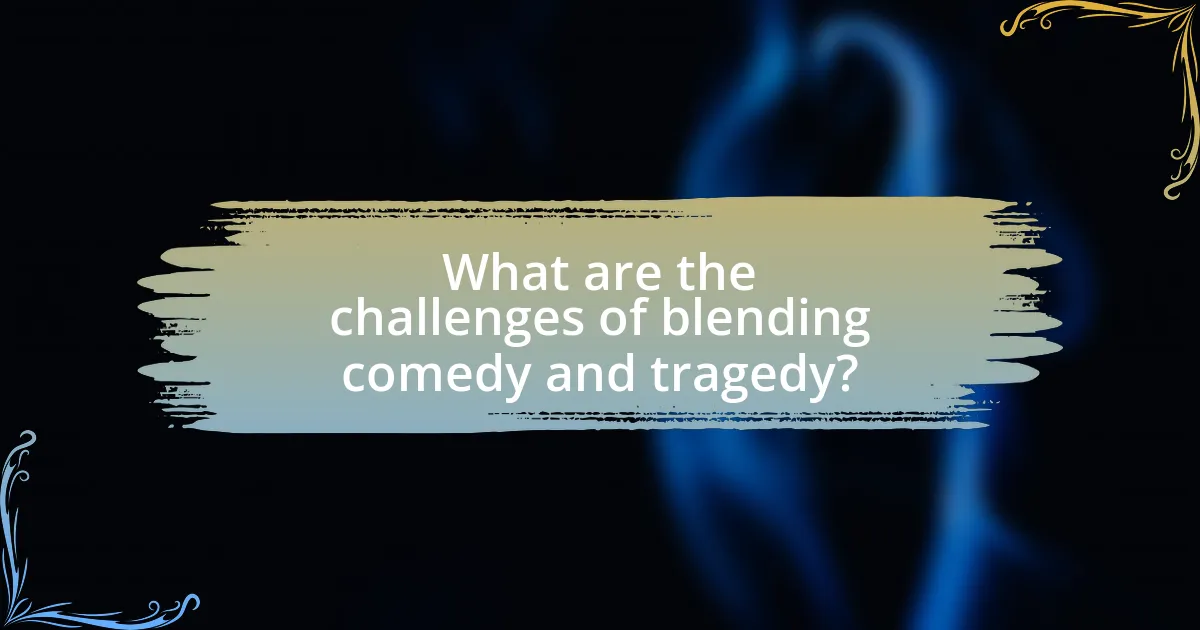
What are the challenges of blending comedy and tragedy?
Blending comedy and tragedy presents the challenge of balancing emotional tones to avoid alienating the audience. This difficulty arises because humor can undermine the gravity of tragic moments, leading to a disjointed narrative that confuses viewers. For instance, in Shakespeare’s “Hamlet,” the use of comedic elements in grave situations can create tonal shifts that may detract from the overall impact of the tragedy. Additionally, the risk of trivializing serious themes can result in audience discomfort, as seen in films like “Life is Beautiful,” where the juxtaposition of humor against the backdrop of the Holocaust raises ethical questions about representation. These challenges necessitate a careful approach to ensure that both comedic and tragic elements coexist harmoniously, enhancing rather than detracting from the storytelling experience.
How can humor be misinterpreted in serious contexts?
Humor can be misinterpreted in serious contexts when the intent behind the humor is not aligned with the emotional state of the audience. For instance, jokes made during a funeral may be perceived as disrespectful, leading to feelings of offense rather than amusement. Research indicates that humor often relies on shared understanding and context; when these elements are absent, the humor can fall flat or be seen as inappropriate. A study published in the Journal of Personality and Social Psychology by Ford, et al. (2017) highlights that humor can exacerbate tensions in sensitive situations, as it may be viewed as trivializing the gravity of the circumstances. Thus, the mismatch between the humor’s intent and the audience’s emotional response can lead to significant misinterpretations.
What are the risks of offending audiences when addressing tragic subjects with humor?
Addressing tragic subjects with humor carries significant risks of offending audiences, primarily due to the potential for insensitivity and misinterpretation. When humor is applied to sensitive topics, it can trivialize the experiences of those affected, leading to feelings of disrespect or alienation. For instance, research indicates that humor related to trauma can evoke strong emotional reactions, with studies showing that 70% of individuals may find such humor inappropriate if they have personal connections to the tragedy. Additionally, cultural differences in humor perception can exacerbate the risk, as what is considered funny in one context may be deeply offensive in another. Thus, the intersection of comedy and tragedy requires careful navigation to avoid alienating or hurting audiences.
How can comedians navigate sensitive topics without crossing boundaries?
Comedians can navigate sensitive topics without crossing boundaries by employing empathy, understanding their audience, and focusing on shared human experiences. By prioritizing the feelings and perspectives of those affected by the topics, comedians can create humor that resonates without being offensive. Research indicates that humor can be a coping mechanism, and when comedians approach sensitive subjects with care, they can foster connection rather than alienation. For instance, comedians like Hasan Minhaj and John Mulaney often address personal and societal issues through storytelling, which allows them to engage audiences while maintaining respect for the subjects at hand.
What ethical considerations arise in using humor during tragedies?
Using humor during tragedies raises significant ethical considerations, primarily concerning sensitivity to victims and their families. Humor can be perceived as disrespectful or trivializing the suffering experienced by those affected, leading to potential emotional harm. For instance, research indicates that humor can serve as a coping mechanism, but it must be employed carefully to avoid alienating or offending individuals who are grieving. Additionally, the context in which humor is used plays a crucial role; humor that is inclusive and empathetic can foster healing, while humor that is dismissive or mocking can exacerbate pain and division. Therefore, ethical use of humor in tragic situations requires a nuanced understanding of the audience’s feelings and the broader implications of the comedic content.
How do comedians balance respect for victims with the need for humor?
Comedians balance respect for victims with the need for humor by employing sensitivity and context in their material. They often focus on shared human experiences and use humor as a coping mechanism, allowing audiences to process difficult topics. For instance, comedians like Jon Stewart and Hasan Minhaj address serious issues while maintaining a tone that fosters understanding rather than ridicule, demonstrating that humor can serve as a bridge to empathy. Research indicates that humor can facilitate healing and resilience, as seen in studies published in the Journal of Humor Research, which highlight how laughter can alleviate stress and promote social bonding in the face of adversity.
What guidelines can be followed to ensure responsible humor in tragic contexts?
To ensure responsible humor in tragic contexts, one should prioritize sensitivity to the affected individuals and communities. This involves understanding the gravity of the situation and avoiding jokes that could trivialize pain or suffering. For instance, humor should be inclusive and not target marginalized groups, as research indicates that humor can reinforce stereotypes and perpetuate harm (Cuddy et al., 2007, Psychological Science). Additionally, context matters; humor that arises organically from shared experiences can foster connection rather than division. By adhering to these guidelines, one can navigate the delicate balance between comedy and tragedy effectively.
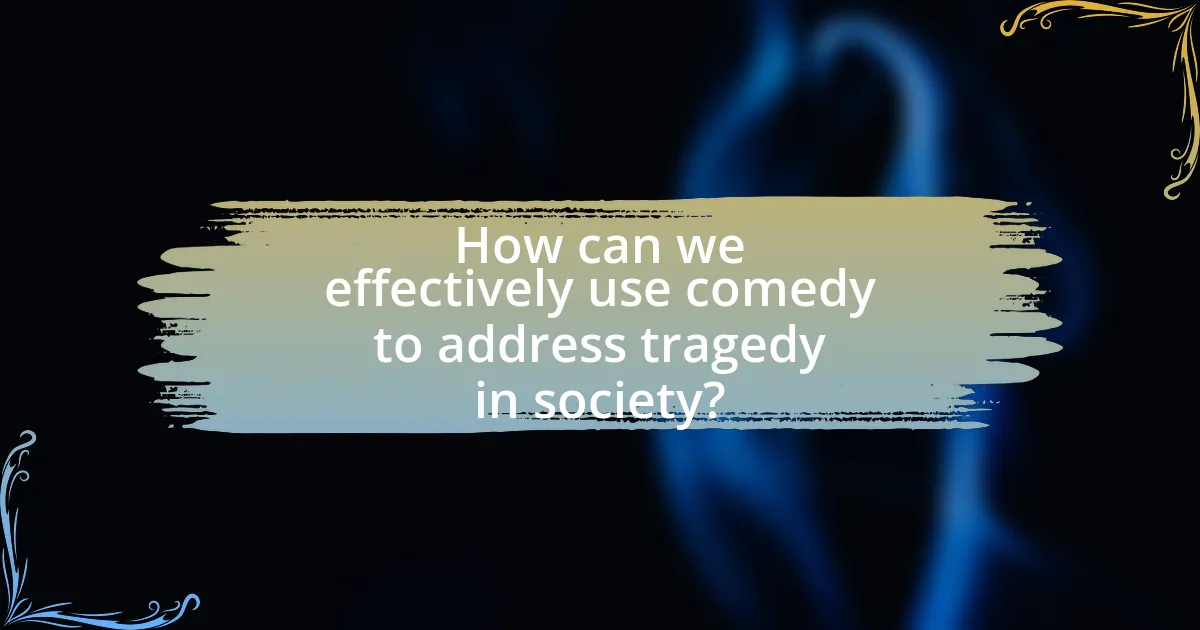
How can we effectively use comedy to address tragedy in society?
Comedy can effectively address tragedy in society by providing a means to process grief and foster resilience. Humor allows individuals to confront painful realities in a less threatening manner, facilitating discussions about difficult topics. For instance, comedians like Jon Stewart and John Oliver have used satire to highlight social injustices, prompting audiences to reflect on serious issues while engaging in laughter. Research indicates that humor can reduce stress and improve coping mechanisms, as seen in studies published in the Journal of Health Psychology, which demonstrate that laughter can enhance emotional well-being during challenging times.
What role do comedians play in social commentary on tragic events?
Comedians serve as critical voices in social commentary on tragic events by using humor to address and process difficult subjects. Through satire and observational comedy, they can highlight societal issues, challenge prevailing narratives, and provide relief in the face of adversity. For instance, during the aftermath of the September 11 attacks, comedians like Jon Stewart and Stephen Colbert used their platforms to discuss the tragedy while also critiquing political responses, demonstrating how humor can facilitate dialogue and reflection on serious matters. This approach not only engages audiences but also encourages them to confront uncomfortable truths, making comedians vital in shaping public discourse around tragedy.
How can humor promote healing and resilience in communities?
Humor can promote healing and resilience in communities by fostering social connections and reducing stress. When individuals share laughter, it strengthens bonds and creates a sense of belonging, which is crucial during challenging times. Research indicates that humor can lower cortisol levels, the stress hormone, thereby enhancing emotional well-being. For instance, a study published in the Journal of Health Psychology found that laughter can improve mood and increase pain tolerance, contributing to a more resilient community. Additionally, humor can serve as a coping mechanism, allowing individuals to reframe difficult situations and find hope amidst adversity.
What impact does comedic relief have on public discourse surrounding tragedy?
Comedic relief serves to alleviate tension and foster dialogue in public discourse surrounding tragedy. By introducing humor, it allows individuals to process grief and trauma in a less confrontational manner, facilitating emotional release and connection. For instance, during the aftermath of significant events like natural disasters or terrorist attacks, comedians often use satire to address societal issues, prompting discussions that might otherwise be avoided. Research indicates that humor can enhance coping mechanisms, as seen in studies published in journals like “Psychological Science,” which demonstrate that laughter can reduce stress and promote resilience in the face of adversity. Thus, comedic relief not only provides a temporary escape but also encourages a more open and constructive conversation about difficult subjects.
What practical tips can help individuals find humor in their struggles?
Individuals can find humor in their struggles by practicing self-reflection and reframing negative experiences into humorous narratives. This approach allows individuals to gain perspective on their challenges, making them feel less overwhelming. Research indicates that humor can serve as a coping mechanism, reducing stress and enhancing emotional resilience. For instance, a study published in the journal “Psychological Science” found that individuals who used humor during difficult times reported lower levels of anxiety and depression. By actively seeking out the absurdities in their situations and sharing these moments with others, individuals can foster a sense of connection and lighten their emotional burden.
How can journaling or creative expression enhance the ability to find humor?
Journaling and creative expression enhance the ability to find humor by allowing individuals to process their experiences and emotions, which can lead to a clearer perspective on life’s challenges. Engaging in these activities encourages reflection and the exploration of thoughts, often revealing absurdities or contradictions that can be humorous. Research indicates that expressive writing can improve emotional regulation and resilience, making it easier to identify and appreciate humor even in difficult situations. For instance, a study published in the Journal of Clinical Psychology by Pennebaker and Chung (2007) found that expressive writing helps individuals reframe their experiences, fostering a mindset that is more open to humor.
What resources are available for those looking to explore humor in tough times?
Resources available for those looking to explore humor in tough times include books, online courses, podcasts, and support groups. Books such as “The Humor Code” by Peter McGraw and Joel Warner provide insights into the psychology of humor, while online platforms like Coursera offer courses on comedic writing and performance. Podcasts like “The Moth” feature storytelling that often incorporates humor in challenging situations, and support groups, such as those found on platforms like Meetup, allow individuals to share experiences and laughter in a communal setting. These resources collectively help individuals navigate difficult times through the lens of humor, reinforcing the therapeutic benefits of laughter.
